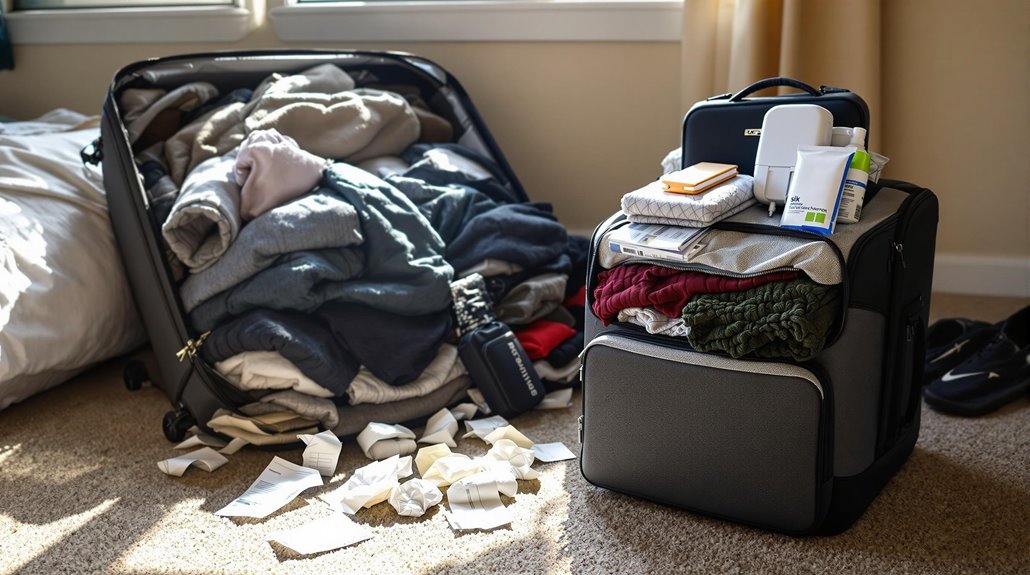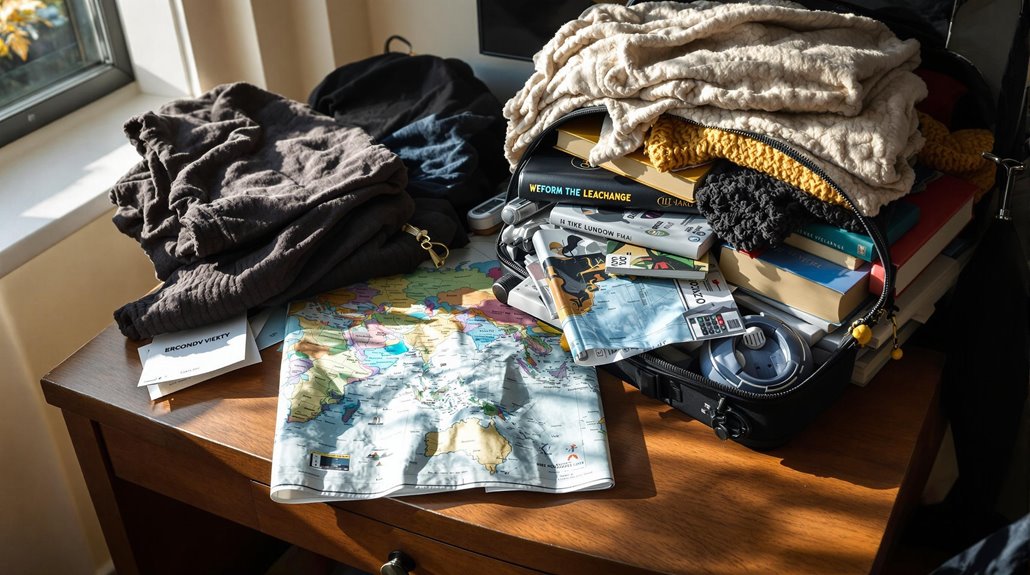You'll face challenges beyond language barriers when studying abroad, from unexpected culture shock to complex money management and healthcare systems. Local student life differs dramatically from tourist experiences, requiring smart packing, tech adaptations, and extensive documentation. Building a support network takes time, but engaging with student organizations and learning basic phrases helps. Understanding these nine essential aspects will transform your international education journey from overwhelming to extraordinary.
- Language Barriers Go Beyond the Classroom
- Culture Shock Hits in Unexpected Ways
- Money Management Matters More Than You Think
- Local Student Life Differs From Tourist Experiences
- Packing Smart Saves Time and Money
- Healthcare Systems Vary Dramatically
- Building a Support Network Takes Time
- Technology Adaptations Are Essential
- Documentation and Paperwork Requirements
- The Last Word
Language Barriers Go Beyond the Classroom

While you might expect language barriers to primarily affect classroom learning, the challenges international students face extend far beyond lecture halls and textbooks.
You'll quickly discover that daily tasks like ordering coffee, reading public notices, or even attending social events can become unexpected hurdles. Nearly half of foreign students struggle with untranslated public notices, while 35% find basic activities like banking and shopping particularly challenging. According to research, with only 11.38% of Indians speaking English, these everyday interactions become even more complex.
Even if you're fluent in English, you'll notice how mixed language use in various settings can create cognitive overload. You might find yourself excluded from group conversations when peers switch to their native languages, and understanding local idioms can feel like solving a puzzle. Creating a monthly savings budget before departure can help offset unexpected translation service costs.
From maneuvering through public services to participating in community events, language barriers can impact almost every aspect of your study abroad experience.
Culture Shock Hits in Unexpected Ways
Even if you've thoroughly researched your host country, culture shock can blindside you in ways you'd never expect.
You might find yourself overwhelmed by unfamiliar sights and sounds during your first week, or discover that simple tasks like grocery shopping become anxiety-inducing adventures.
Don't be surprised if you hit a wall around month two, when the initial excitement fades and frustration sets in.
The honeymoon phase doesn't last forever. Be prepared for that moment when cultural differences stop feeling charming and start feeling challenging.
What's more surprising is that returning home can be just as challenging.
You'll likely experience reverse culture shock for about a month, finding your old routines oddly boring and your hometown weirdly unfamiliar.
Establishing daily coping strategies during your readjustment period can help minimize feelings of disconnection and disorientation.
The best defense? Build local friendships early, maintain familiar routines, and remember that these feelings are completely normal – even the most seasoned travelers experience them. Taking time to join student clubs can make the transition smoother by connecting you with like-minded peers.
Money Management Matters More Than You Think

Despite thorough pre-departure planning, the reality of managing money abroad often hits students like a financial tsunami.
You're not alone if you've underestimated those sneaky daily expenses – over half of international students struggle with budgeting in foreign countries, compared to just 29% who thought they'd have issues before leaving.
Those daily coffee runs, bus tickets, and laundromat visits? They'll drain your wallet faster than you can say "exchange rate."
Speaking of which, you're probably losing hundreds in transfer fees without realizing it – U.S.-bound students collectively overpay a staggering $437 million annually.
Creating a comprehensive budget plan before departure can help you avoid these common financial pitfalls.
If you're relying on your parents or domestic banks to manage your money (like 55% of Indonesian students do), it's time to explore smarter financial options. A shocking 67% of students already studying abroad report mismatches between their planned and actual spending.
Your future self will thank you!
Local Student Life Differs From Tourist Experiences
Living as a student abroad fundamentally differs from being a tourist in ways you'll notice from day one. Unlike travelers who bounce between attractions, you'll experience authentic daily life through shared housing with locals, creating deep connections that shape your understanding of the culture. Your experience may involve living with Japanese students in apartments that provide genuine cultural exchange opportunities. The personal transformation benefits of immersive study abroad experiences often exceed expectations.
- Sharing morning coffee with your host family while practicing the local language
- Walking to class through neighborhood streets rather than tourist hotspots
- Shopping at local markets where residents haggle over fresh produce
- Studying in cafes where students gather for group projects
- Attending local university events and club meetings instead of guided tours
You'll discover that real culture happens in these everyday moments, where you're not just observing the culture but actively participating in it as a temporary local.
Packing Smart Saves Time and Money

When you're preparing for a semester abroad, smart packing strategies can make the difference between a smooth changeover and a logistical nightmare.
You'll save time and money by rolling clothes instead of folding them, using packing cubes to maximize space, and stuffing socks into shoes.
Don't forget to pack essential documents like your passport and visa copies in separate locations for safety.
You're better off bringing versatile clothing pieces that mix and match easily, and consider leaving bulky toiletries behind since you can buy them at your destination.
For electronics, pack a universal adapter and organize your cables with binder clips to prevent a tangled mess.
Remember to wear your heaviest items during travel to free up precious luggage space.
Research carefully to ensure your clothing choices respect local dress customs and avoid any cultural misunderstandings during your stay.
Consider organizing your belongings into clear categories to ensure you don't overlook any essential items for your journey.
Healthcare Systems Vary Dramatically
Understanding your host country's healthcare system before departure could save you from major headaches – both literal and financial.
You'll find healthcare models ranging from state-funded systems like the UK's to out-of-pocket models like India's, each with unique requirements and costs. The historical evolution of these systems traces back to Otto von Bismarck, who established the first nationalized healthcare system.
Don't assume your home country's insurance will work abroad – many nations require specific documentation or expatriate coverage.
- Having to fill out forms in Japanese while running a fever
- Discovering you need cash upfront at an Indian emergency room
- Waiting three months for a dental appointment in Sweden
- Searching for an English-speaking doctor in rural Spain
- Realizing your U.S. insurance card means nothing in Germany
Remember to research emergency numbers, required vaccinations, and whether you'll need supplemental travel insurance for your destination.
Building a Support Network Takes Time

Building meaningful connections in a foreign country requires patience, persistence, and a willingness to step outside your comfort zone.
You'll find that joining student organizations, participating in study groups, and attending campus events are excellent ways to meet like-minded peers.
Don't underestimate the power of learning basic local phrases – they'll help you navigate daily interactions and show respect for the host culture.
Learning a few local expressions opens doors and hearts, showing genuine interest in connecting with your host community.
While campus engagement is essential, you can accelerate your networking through online communities like Meetup groups and university-specific platforms.
Consider reaching out to expatriate communities for additional support and shared experiences during your transition abroad.
Set realistic goals, like making two new connections per week, and remember to balance social activities with your academic commitments.
Consider using time-blocking tools to organize your schedule, ensuring you're making steady progress in both areas.
Having translation apps readily available on your phone can help break down language barriers and facilitate smoother social interactions with local students.
Technology Adaptations Are Essential
Successful study abroad experiences now depend heavily on mastering the right technological tools and platforms.
You'll need to embrace apps and digital solutions that make traversing your host country smoother, from language learning tools to payment systems.
Consider downloading these essential tech tools before departure:
- A reliable language app that lets you practice local phrases during your morning commute
- A transit app that won't leave you stranded when you're trying to find that hidden café
- A payment platform that works seamlessly in your host country's shops
- A safety app that keeps you connected with friends and family back home
- A learning management system that helps you stay on top of coursework while exploring
These digital companions will transform potential hurdles into manageable challenges during your time abroad.
A VPN service provider can help you maintain access to your favorite streaming content while studying in different regions.
Taking advantage of virtual campus tours before selecting your destination can help you make a more informed decision about your study abroad location.
Documentation and Paperwork Requirements

While mastering the right tech tools can smooth your study abroad journey, proper documentation serves as the bedrock of your international adventure.
You'll need a valid passport with at least six months' validity beyond your program's end date, and you shouldn't wait until the last minute, as processing can take 8-12 weeks.
Your visa application will require an acceptance letter, financial proof, and translated academic records, so start gathering these documents early.
Don't forget about health documentation – you'll need immunization records and insurance coverage that meets your host country's requirements.
Keep digital copies of everything, including your passport's bio pages and visa stamps, and get official translations of medical prescriptions if you're taking regular medication.
Consider obtaining an International Student Identity Card to access student discounts on travel and accommodations during your time abroad.
Creating a detailed pre-departure checklist will help ensure you don't overlook any critical documentation requirements for your European adventure.
Organization is key!
The Last Word
Like a butterfly emerging from its cocoon, you'll transform through your study abroad journey. Now that you're armed with these nine essential insights, you'll navigate cultural differences, manage finances, and handle practical challenges with greater confidence. While surprises will still pop up along the way, you're better prepared to embrace the adventure ahead and make the most of this life-changing experience abroad.

